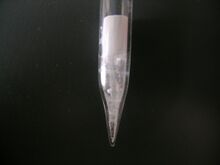Chemistry:Caesium cadmium bromide
From HandWiki

| |
| Names | |
|---|---|
| IUPAC name
Caesium cadmium bromide
| |
Other names
| |
| Identifiers | |
| Properties | |
| Cs Cd Br3 | |
| Molar mass | 485.028 g/mol |
| Appearance | white or colourless solid |
| Density | 4.53 g/cm3[1] |
| Melting point | 450 °C (842 °F; 723 K) |
| Structure | |
| cubic | |
Except where otherwise noted, data are given for materials in their standard state (at 25 °C [77 °F], 100 kPa). | |
| Infobox references | |
Caesium cadmium bromide (Cs Cd Br3) is a synthetic crystalline material. It belongs to the AMX3 group (where A = alkali metal, M = bivalent metal, X = halogen ion). Unlike most other bromides, CsCdBr3 is non-hygroscopic,[2] giving it applications as an efficient upconversion material in solar cells.[3] As a single crystal structure doped with rare-earth ions, it can be also used as active laser medium. It is highly transparent in the visible and infrared regions and can be used as a nonlinear optical crystal.[4]
Caesium cadmium bromide with the formula Cs2CdBr4 has also been synthesized.[5]
References
- ↑ Persson, Kristin (2014). "36 Materials Science". Materials Data on CsCdBr3 (SG:221) by Materials Project (Data Set). LBNL Materials Project; Lawrence Berkeley National Laboratory (LBNL), Berkeley, CA (United States). doi:10.17188/1275593.
- ↑ Barthem, R. B.; Buisson, R.; Vial, JC.; Chaminade, JP. (1985). "ENERGY TRANSFER IN CsCdBr3 : Nd3+SYSTEM". Le Journal de Physique Colloques 46: C7–113–C7–117. doi:10.1051/jphyscol:1985722. https://hal.archives-ouvertes.fr/jpa-00224972/file/ajp-jphyscol198546C722.pdf.
- ↑ Cockroft, Nigel J.; Jones, Glynn D.; Nguyen, Dinh C. (1992). "Dynamics and spectroscopy of infrared-to-visible upconversion in erbium-doped cesium cadmium bromide (CsCdBr3:Er3+)". Physical Review B 45 (10): 5187–5198. doi:10.1103/PhysRevB.45.5187. PMID 10000233. Bibcode: 1992PhRvB..45.5187C.
- ↑ Ren, Peng; Qin, Jingui; Chen, Chuangtian (2003). "A Novel Nonlinear Optical Crystal for the IR Region: Noncentrosymmetrically Crystalline CsCdBr3and its Properties". Inorganic Chemistry 42 (1): 8–10. doi:10.1021/ic025813y. PMID 12513072.
- ↑ Altermatt, D.; Arend, H.; Gramlich, V.; Niggli, A.; Petter, W. (1984). "Low-temperature phases in Cs2CdBr4and Cs2HgBr4". Acta Crystallographica Section B 40 (4): 347–350. doi:10.1107/S0108768184002275.
 |

